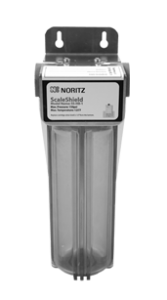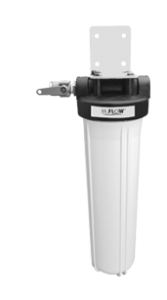Hard water: It’s not frozen and it hasn’t been lifting weights at the gym. “Hard water” means the water running through your pipes contains a high level of minerals, such as calcium and magnesium.
At an average temperature, these minerals combine with the water coming into your house. When water is heated, these minerals separate and latch onto the surfaces of your water heater and pipes. That creates buildup, causing inefficiency, damage and the need for replacement in certain circumstances. And, it’s not just the heaters and pipes you’ll be replacing, either. Faucets and showerheads get clogged due to the scale buildup. Depending on how many faucets or showerheads are in a home, the cost of replacing them may increase the amount of money you have to spend.
So, you may be asking yourself, “How can I tell if I have hard water? Should I consider investing in a water softening system?”
Here’s a 4-step trick to test if you have hard water. All you’ll need is a bottle of dish soap and water from a faucet:
Step 1: Get a bottle you can easily fill. Fill it halfway with the water you want to test. Screw on a cap (or put a thumb over the opening) and shake it up. Remove the cap (or thumb) and pour the water out.
Step 2: Fill the same bottle halfway again and add 5 drops of liquid dish soap. Cap it off and give it a couple good shakes.
Step 3: If the bottle is full of soapsuds and the suds flow out when the cap is removed, then congrats! You do not have hard water.
Step 4: The more you must shake the bottle to create soapsuds, and the less time those suds last, the “harder” your water. In short: If all you get is a soapy film in the bottle, then you have very hard water.
The most cost-effective solution to hard water problems is to install a water softener system, such as a Noritz Scale Shield: A unique product that provides superior lime scale prevention and corrosion control for your tankless water heater while still retaining the beneficial minerals in your water.
The Scale Shield requires no extra electricity or maintenance, and needs a cartridge replacement only one or two times per year.
For homes that have very hard to extremely hard water, a Noritz H2Flow System is most recommended. The H2Flow System requires no salt or chemicals and has no discharge. The H2Flow retains the beneficial minerals in water, produces no water waste, and needs to be replaced no more than every two years. Installing the H2Flow also extends the life of your tankless water heater system, and even reverses pre-existing scale problems.
The simple test we’ve included here is a quick way to determine if you need to take action on hard water. If you do have any concerns about hard water or switching your water to a water softening system, contact a Noritz University trained plumber for more information.
For more information on managing hard water and information about our selection of tankless water heaters, visit Noritz.com.


